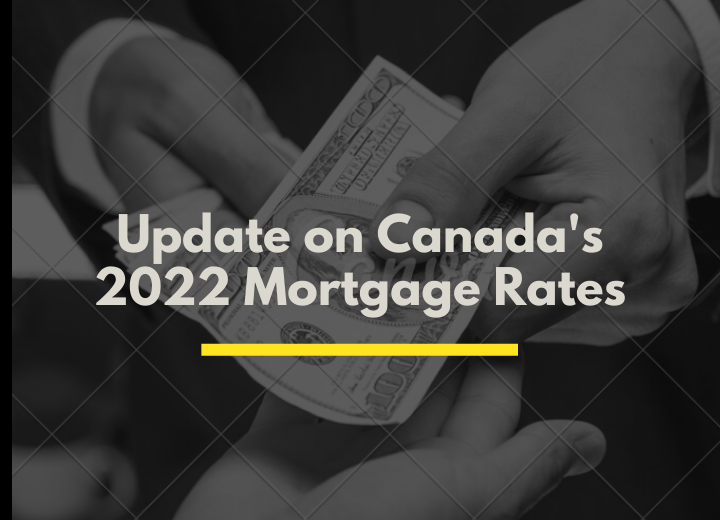Mortgage rates in Canada have been quite complex over the last few years. The Canadian market houses and operates as per the multiple available mortgage features, products and technologies, making banks in Canada a crucial player in the market. The Bank of Canada – the country’s central bank takes charge of the entire mortgage market in Canada and determines the interest rates every month.
To fuel a speedy recovery of the country’s economy, the central bank in Canada has been keeping the overnight mortgage rates at a lower bound of 0.25% for almost two years now.
As per the Bank of Canada’s announcement in March, the overnight mortgage rate of 0.25% would likely remain the same till 2023. Additionally, no changes have been seen in the conventional five-year mortgage rate of 4.79% since August 2020.
In this article, let’s dive in to understand the situation of the mortgage rates in Canada amidst the pandemic and how you can best use it to purchase your home in the country.
Insights of the Latest Rate Announcement by the Bank of Canada
During the tough times of the pandemic, it was not unexpected that the bank would keep the overnight rate at0.25%. Additionally, it also made a strong commitment to not make any changes in the overnight rate throughout the COVID era.
Though some positive events occurred in the starting months of 2022, such as COVID-19 vaccine rollout and progressive economic recovery, the country is still facing unemployment in specific industries.
A lot of people who are part-time and hourly workers in the sectors such as tourism, hospitality and retail are still unemployed and struggling financially. To the Bank of Canada, nothing is more important than the country’s economic recovery. It is only then that they will be making further decisions regarding amendments in overnight mortgage rates in Canada.
BOC has also announced that it will continue to keep the mortgage rates low at 0.25% until 2023. It declared that this would remain a significant factor to analyze and consider.
The Impact of Low Mortgage Rates on Real Estate in Canada
It is undeniable that low mortgage interest rates are a great factor in raising the demand for real estate in the country. The pandemic has invoked a drastic change to the general lifestyle of the populace wherein people have reconsidered their living situation, especially those who are working from their homes.
This has become a motivational factor for people to consider buying a home that best suits their current requirements. Considering the prevailing low mortgage rates, more people are planning to buy a house.
Though it has been declared that the overnight mortgage rates are not going to change anytime soon, variable rate and fixed-rate mortgages have been gradually disuniting throughout the initial months of 2022.
The overnight rates have majorly influenced the variable rates since the former is used as a standard benchmark by banks to calculate their own prime rate that further helps in generating the offerings of their variable mortgage rate. Thus, the variable rates are considered unchanged.
Alternatively, fixed-rate mortgages have been slowly moving upward, which has resulted in the elevated demand for variable rate options. Since the fix rates are a bit high these days, there is more demand for variable rates. The yawning gap between fixed and variable is higher than what it was before as the variable rates remained constant. So, even though fixed rates are popular for mortgages, many people today are inclining more towards variable rates.
Important Updates for Current Mortgage Holders
Considering the unpredictable economic conditions, opting for a fixed-rate or variable-rate mortgage might be a bit daunting for potential home buyers. Thus, the personal circumstances and strategies of the mortgage holders should influence the decision of choosing between a fixed or variable rate.
However, those who do not wish to take risks would not opt for a variable-rate mortgage and instead go for a fixed rate. Those with financial flexibility and who can bear some uncertainty can opt for a variable rate. Existing mortgage holders might find ultra-low mortgage interest rates in Canada an exciting prospect as they could now agree to break their term and grab a lower rate to acquire savings for other projects.
Talking about the fixed-rate mortgage, usually, consumers do not have much savings as huge penalties are levied for breaking the mortgage. In such cases, it is essential to get a mortgage penalty quote from the provider and ask your mortgage broker to make the correct calculations. These are the proper steps to determine the best approach.
If your term is close to the end, it is more appropriate to opt for breaking or prepaying your mortgage, especially if you have analyzed that the rates will be higher till your renewal time.
Scope for Mortgage Rates in 2022
Although it is uncertain when the real estate market will be back on track, the demand for real estate in Canada has quickly increased since the middle of 2020. It has also been anticipated that it will keep accelerating throughout the spring market.
A glance through the variable rates suggests constancy, whereas fixed rates are expected to increase in moderation throughout this year and probably, in the next year as well. It is crucial to remain optimistic about unemployment levels and vaccine distribution. If the situation gets back to normal, there will hopefully be a rate forecast soon.
In case you are seeking up-to-date information on the Canadian housing market, mortgage rates or 5 year fixed mortgage rates in Canada, you can reach out to the mortgage experts at Square Yards, who will provide you with the most relevant sources.
Current Bank of Canada Mortgage Rates
Here are all mortgage terms available in Canada, right from 6 months to 10 years and variable. Know in detail about the best Bank of Canada mortgage rates from the table given below.
| Type | Rate | Previous | Change | Changed On |
| 6 Month | 2.79% | 2.99% | -0.20% | Sep 19, 2020 |
| 1 Year | 2.19% | 1.79% | 0.40% | Nov 17, 2021 |
| 2 Year | 1.99% | 1.54% | 0.45% | Nov 17, 2021 |
| 3 Year | 2.54% | 2.34% | 0.20% | Dec 7, 2021 |
| 4 Year | 2.64% | 2.49% | 0.15% | Dec 7, 2021 |
| 5 Year | 2.69% | 2.59% | 0.10% | Dec 7, 2021 |
| 7 Year | 3.04% | 2.94% | 0.10% | Dec 7, 2021 |
| 10 Year | 3.30% | 3.24% | 0.06% | Nov 17, 2021 |
| Variable | 1.39% | 1.65% | -0.26% | Mar 15, 2021 |
Final Thoughts
If you plan to buy a property in Canada anytime soon, we would suggest you understand the difference between a short-term or a long-term mortgage first since it affects the interest rate. You will get a lower interest rate in a short-term mortgage as it demands frequent renewal. Further, if you opt for a long-term mortgage, you will get stability since there is no need for frequent renewal. Short-term mortgage holders can take advantage of lower interest rates on renewal if the market fluctuates, however, long-term mortgage holders cannot benefit from it.















